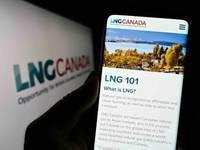Why US producers are paying attention to Canada's most popular shale play
Executives, analysts, and advisors say that U.S. producers of oil and gas are seeking new drilling territories in Western Canada's Montney Basin, an enormous shale play in a remote area. The basin is already a hub of M&A and may see even more deals in the near future. The United States has become the largest oil producer in the world as a result of extensive drilling on shale deposits over the past 15 years. After a period of rapid expansion, oil producers are less interested in drilling prospects within the Permian oilfield, which extends across Texas and New Mexico. This is because the remaining area with high-production potential has shrunk.
Suncor trims budget and projects increased oil and gas production in 2026
Suncor Energy forecast lower spending for 2026, despite increased oil and gas production. The company will tighten?costs, and increase shareholder returns through an expanded buyback plan. Suncor's outlook is similar to that of Canadian Natural Resources, Cenovus Energy and other oil sands producers in Canada. After years of investment, Canada's oil-sands producers have become among North America's low-cost operators and outperformed global competitors amid an oil?recession. Suncor, based in Calgary, Alberta, expects to produce between 840,000 and 875,000 barrels of oil per day (bpd) next year. This is an increase from its estimate for 2025 which was 810,000-840,000 bpd.
Documents show that Alberta oil regulators stopped enforcing gas flare limits after government pressure.
Documents seen by have revealed that the regulator responsible for environmental enforcement in Canada’s largest oil-producing province, bowed to pressure from both the provincial government and major oil companies in order to remove a limitation on natural gas flare ups as Canadian oil production increased. Alberta's decision to remove its 20-year old flaring limit, after companies exceeded the limit twice in a row with no objections by the federal government is a good example of Canada's challenges in reconciling environmental commitments and a renewed focus of economic growth.
The battle for MEG Energy in Canada
The shareholders of MEG Energy will vote on Thursday, which could end the long-running battle for the Canadian oil sands manufacturer. This is the timeline for events in this year. Strathcona Resources, a Canadian oil and natural gas producer, announces that it will launch a hostile bid to take over MEG. The deal values the company at C$5.93billion ($4.25billion). MEG's Board urges its shareholders to reject Strathcona bid on June 16, calling it inadequate. The board has announced that it will conduct a strategic review in order to look at alternatives.
Cenovus Reports Rise in Q3 Profit

Cenovus Energy reported a rise in third-quarter profit on Friday, driven by record oil sands production and near-full refinery utilization that helped offset weaker crude prices.The Calgary, Canada-based oil and gas producer pursues a major expansion through its planned acquisition of MEG Energy for about $6 billion.A MEG shareholder vote on the deal was postponed this week to allow for additional regulatory disclosures.The regulatory inquiry is related to a complaint raised by a former employee of MEG who holds approximately 4,000 shares, Cenovus CEO Jon McKenzie said on a conference call.He said Cenovus did not expect the inquiry to affect the transaction…
MEG Energy suspends the shareholder vote on Cenovus' offer, citing a regulatory inquiry
MEG Energy's board has postponed the expected shareholder vote on Thursday regarding a Cenovus Energy buyout. The board said that a regulatory investigation had prompted them to need more information. MEG Energy's board chairman James McFarland announced that the vote on the sale will be held on November 6, instead of ending a long-running bidding war for Canada's only pure-play oil-sands producer. Cenovus consented to the adjournment, he explained, which will allow MEG to disclose information about an asset deal announced on Monday between Cenovus, a former rival bidder, and Strathcona.
Cygnet Energy acquires Kiwetinohk for $1 billion
The companies announced on Tuesday that Cygnet Energy, a privately held company, will purchase Kiwetinohk Energy for C$1.4 billion, including debt. This deal creates a larger Montney-Duvernay operator. Montney and Duvernay in Alberta are Canada's most prolific oil and gas shale plays. They have driven much of the recent growth in production and investment in western Canada. Cenovus Energy, Strathcona Resources and MEG Energy engaged in a battle to take over MEG Energy earlier this year. The companies were interested in its prized asset, the Christina Lake oil-sands project. It is located also near Alberta. According to calculations, Cygnet's price per share will be C$24.75.
ConocoPhillips will lay off Canada employees by November, a company memo shows

According to three sources, and according to a memo from the company, ConocoPhillips will be laying off workers at its Canadian operations as part of its plan to reduce its global workforce to up to one quarter by next year. The memo didn't specify how many layoffs were to take place, but it said that they would start at the Canadian operations of the company in the first week November. The memo stated that employees in Calgary would be notified in a virtual manner on November 5, and those at the company's Surmont Oil Sands operation in northern Alberta, and Montney Shale Play in British Columbia in person the next day.
MEG Energy postpones shareholder vote on Cenovus $6 billion merger

The months-long battle for control of Canada’s last pure-play company in the oil sands sector took on a new twist on Tuesday when MEG Energy Corp. postponed an upcoming meeting where shareholders were scheduled to vote on Cenovus Energy’s proposed takeover. Cenovus has exercised its contractual rights to postpone the meeting. MEG announced that it will now be held on 30 October, instead of Wednesday. Cenovus will have more time to convince investors of its offer. It has already sweetened it once, after MEG shareholders complained that the initial bid was too low.
Imperial Oil Canada plans to reduce its workforce by 20% by the end of 2027
Imperial Oil Canada announced on Monday that it will reduce its workforce by 20% by the year 2027. This is part of a major reorganization designed to cut costs through centralizing and consolidating operations in specific locations. Imperial Oil, which is owned by the top U.S. oil company Exxon Mobil and had approximately 5,100 employees at the end of 2024 according to a filing with regulatory authorities, has been undergoing a major restructuring. Global crude oil prices have fallen this year as a result of increased production from the OPEC+ oil producer group and uncertainty over trade policies. ConocoPhillips, SLB and other U.S.
Head of industry association says that Canada's oil supply is not as reliable as Japan's, but the Canadian market is still tough.

The head of an industry association in Japan said that Japanese refiners need to diversify their supply sources, as 95% its crude oil imports are from the Middle East. However, importing Canadian oil may be difficult due to its heavy nature. According to two sources who are familiar with the issue, Canada's largest oil-producing province, Alberta, is considering investing in Japan's refinery sector as a way to reduce its dependence on the United States for oil exports. The sources stated that the Alberta government has begun early discussions…
Sources say that Canada could drop its oil emission cap as part of a new climate plan
Three sources familiar with the discussions said that the Canadian government was in talks with Alberta and energy companies about removing a federal cap for emissions in the oil and gas industry if both the province and the industry reduced their carbon footprints in other ways. Sources who weren't authorized to publicly discuss the discussions said that the government of Prime Minister Mark Carney has discussed the removal of the cap with the oil companies, and Canada's leading oil producing province, if they made other environmental concessions. Canada's emission cap has yet to be implemented by legislation.
Sources say that Canada could drop its oil emission cap as part of a new climate plan
Three sources familiar with the discussions said that the Canadian government was in talks with Alberta and energy companies about removing a federal cap on the emissions of the oil and gas industry if they reduced their carbon footprints in other ways. Three sources who weren't authorized to publicly discuss the talks said that the government of Prime Minister Mark Carney has discussed the removal of the cap with the oil companies and Canada’s top oil producing province if both parties make other concessions on the environment. The legislation to implement Canada's emission cap is still pending.
Sources say that Canada could drop its oil emission cap as part a new climate plan
Three sources familiar with the discussions said that the Canadian government was in talks with Alberta and energy companies about removing a federal cap on the emissions of the oil and gas industry if they reduced their carbon footprints in other ways. Three sources who weren't authorized to publicly discuss the talks said that the government of Prime Minister Mark Carney has discussed removing a federal cap on emissions from Canada's oil and gas sector with energy companies and Alberta if the industry and province reduce their carbon footprint in other ways. The Canadian emissions cap is not yet implemented by legislation.
CANADA-CRUDE-Discount on Western Canada Select narrows
On Tuesday, the discount between West Texas Intermediate and Western Canada Select futures (the North American benchmark) narrowed. WCS for Hardisty, Alberta delivery in October settled at $11.20 per barrel below the U.S. benchmark WTI according to brokerage CalRock. This compares with a $11.40 discount on Monday. * The discount on WCS was narrowest since late July. Discounts widened in August due in part to the shutdown of BP's 440,000-barrel-per-day refinery in Whiting, Indiana, which had been affected by flooding after a severe thunderstorm. This refinery is usually the largest buyer of Canadian crude.
Enbridge Sees Demand for More Pipeline Capacity from Canada to US Gulf

Canadian pipeline operator Enbridge said on Friday its recent commercial process to gauge oil shippers' interest in an expansion of its Flanagan South pipeline was oversubscribed, indicating strong demand for additional oil transport capacity from Canada to the U.S. Gulf Coast.The success of the Flanagan South open season — an industry term for the binding process pipeline companies use to notify shippers of available capacity and solicit bids — brings Enbridge closer to formally sanctioning its proposed expansion of its Mainline network, CEO Greg Ebel said on a conference call.He said Enbridge plans to make a final investment decision on the first phase of the project…
Cenovus Energy Lowers 2025 Production Forecast

Canadian oil and gas producer Cenovus Energy lowered the upper end of its full-year upstream production forecast on Thursday, citing the impact from a temporary shut-in of its Rush Lake facilities.The company said it responded to a steam release from a casing failure in an injection well in early May, and as a result, the Rush Lake facilities in west-central Saskatchewan have been temporarily shut-in.Cenovus forecast 2025 upstream production to be between 805,000 barrels of oil equivalent per day and 825,000 boepd, compared with 805,000 to 845,000 boepd projected previously.For the second quarter, its total upstream production was 765,900 boepd, down from 800,800 boepd a year
TC Energy increases its core profit forecast for the full year on natural gas and electricity demand
TC Energy, a Canadian pipeline operator, raised its core earnings forecast for the full year adjusted on Thursday due to increased demand for natural gas and electricity and its North America operations. TC Energy announced in May that it expects a surge in capital projects to be announced later this year or in the following years, due to coal-to gas conversions and growth in data centers driving natural gas demand across North America. The company's quarterly total revenue rose by 12%, to C$3.74billion ($2.70billion), largely due to higher core earnings adjusted from natural gas pipelines in Mexico, Canada and the United States.
Sources say Shell-led LNG Canada is facing problems when it ramps up its production.
Shell-led LNG Canada has been experiencing technical difficulties as it ramps production up at its liquefied gas plant in Kitimat. One LNG tanker was diverted away from the facility recently without superchilled fuel, according to data provided by LSEG and four sources. The facility is the first major LNG-export facility on the West Coast of North America and Canada, and provides direct access to Asia, which is the largest LNG market in the world. When fully operational, the facility will convert approximately 2 billion cubic feet per day of gas (bcfd). Market participants hope that this will increase Canadian natural gas prices.
Canada's New LNG Exports Have Yet to Lift Gas Prices

Last month's start-up of LNG Canada, the country's first large-scale liquefied natural gas export facility, has failed to lift Western Canadian natural gas prices as quickly as some market participants and observers expected, due to a persistent supply glut and the gradual pace of the facility's ramp-up.Shell-led Canada shipped its first cargo of 70,000 metric tons from the country's Pacific coast on June 30, to South Korea.The export facility, located in northern British Columbia, is anticipated to bring 2.1 billion cubic feet per day (bcfd) of new gas demand to Western Canada…